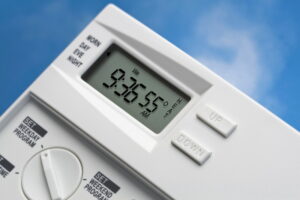 A piece of advice we often give to people who ask about ways they can save on their heating during the summer is to know how to set their thermostat from maximum efficiency. It’s best to keep a thermostat at a steady setting during the day, usually around 68°F, and then lower it by 8°F during the evening, or when people are away. This saves more energy than moving the thermostat up and down as you alternatively feel hot and then cold. This creates too much stopping and starting for the heating system, which wastes energy. The thermostat is a switch, not a throttle, so pushing it up higher doesn’t get you faster heating, only a heating system that runs longer.
A piece of advice we often give to people who ask about ways they can save on their heating during the summer is to know how to set their thermostat from maximum efficiency. It’s best to keep a thermostat at a steady setting during the day, usually around 68°F, and then lower it by 8°F during the evening, or when people are away. This saves more energy than moving the thermostat up and down as you alternatively feel hot and then cold. This creates too much stopping and starting for the heating system, which wastes energy. The thermostat is a switch, not a throttle, so pushing it up higher doesn’t get you faster heating, only a heating system that runs longer.
But what if you’re already setting the thermostat at a steady temperature, but one day find that you’re getting too hot or too cold, and you have to fiddle around with the thermostat regularly to get comfortable? This probably isn’t a “quirk.” It’s a warning that something isn’t going right somewhere in the HVAC system.
